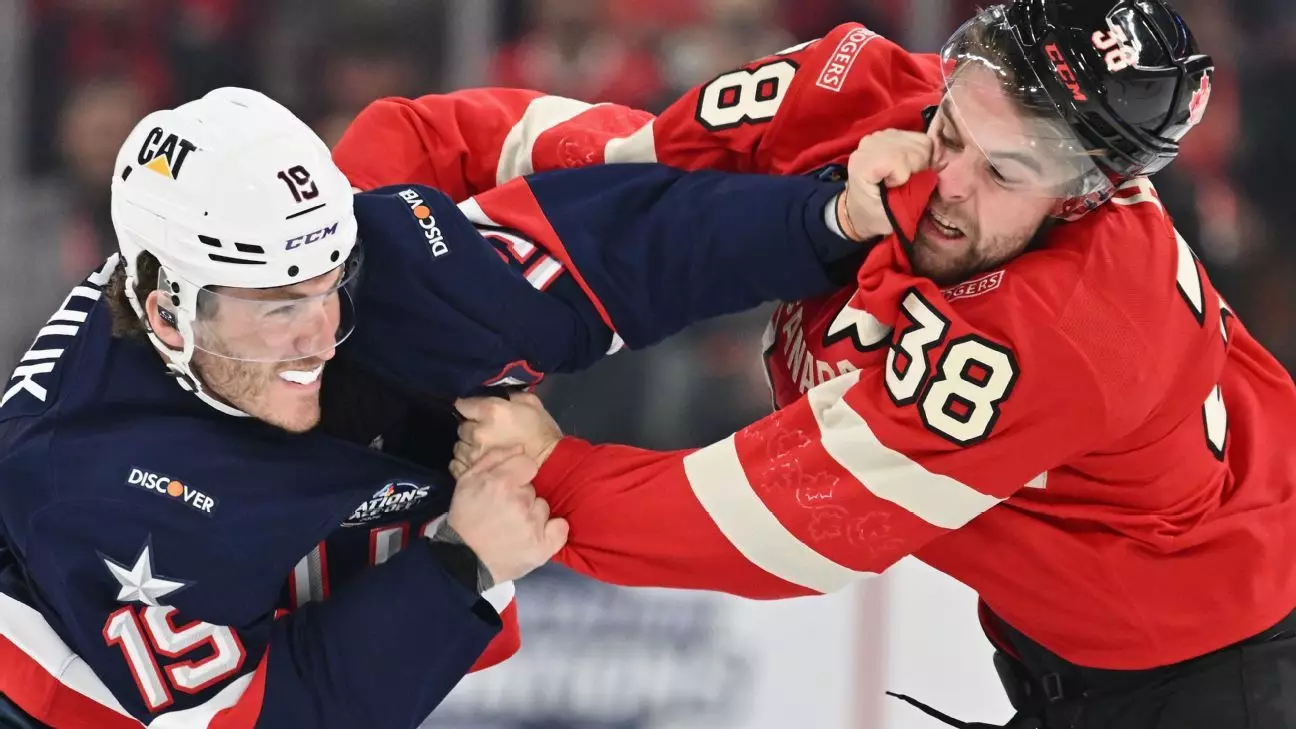In an electrifying evening of sports, the longstanding rivalry between the United States and Canada reached a new zenith during the NHL’s 4 Nations Face-Off. The game, marked by intensity and emotion, culminated in a hard-fought 3-1 victory for Team USA. Beyond the scoreboard, this contest has ignited discussions within the hockey community and among casual viewers about the spirit and future of the sport. Coach Jon Cooper of Team Canada might have been disheartened by the result, but he expressed a sentiment that resonates deeply: “The game is in a better place because last night’s game existed.” These words encapsulate the significance of athletic rivalry and its ability to draw audiences in unprecedented numbers.
The event attracted 5.4 million viewers in the United States, a fitting tribute to the first “best on best” tournament game between these hockey giants since 2016. While many fans turned out to witness elite NHL players donning their national colors, a notable pre-game incident amplified the emotional stakes. Montreal fans resorted to jeering the U.S. national anthem, an act driven by political undertones linked to trade tensions and the whims of leadership that stirred feelings of nationalism and discord.
The game’s opening moments were as explosive as fans could have hoped for, with three fights unfolding within a record nine seconds — a ferocity not often witnessed at international levels. Jesper Bratt of Sweden remarked on the charged atmosphere, emphasizing how the arena’s energy was palpable even before the puck dropped. This flurry of early battles showcased not just personal grievances among players, but the raw emotion connected to playing for one’s country. The Tkachuk brothers, Matthew and Brady, along with J.T. Miller, set the tone for a game that felt more like a war zone than an exhibition matchup.
Interestingly, Matthew Tkachuk rewrote the record books with the fastest fight in NHL international competition, an unscripted moment that encapsulated the fervor inherent in these storied encounters. Yet, his subsequent withdrawal from play due to a lower-body injury raised concerns regarding the physical toll such an aggressive style demands from players, leading to a polarized dialogue surrounding the place of fighting in hockey.
The emotional stakes in sports often run deep, and the celebrated fighting in hockey serves as a metaphor for the tumultuous jockeying between nations. Players like Travis Konecny highlighted this correlation, indicating that the symbolic weight of representing one’s country ignites something primal within players. “It’s a war out there,” he stated, illustrating how patriotism fuels performance in ways seldom seen in other sports.
Against the backdrop of these battles, cooper acknowledged the criticisms levied at fighting in hockey, defending its role in firing up the competition. “You can say whatever you want about fighting, but that was what ignited the game,” he stated. Coaches and fans alike recognize that such intensity can pave the way for a visceral and gripping contest—one that captures the heart of what makes hockey uniquely compelling.
Much more than an isolated event, this contest could very well be a clarion call for the future of hockey in the U.S. In a world where All-Star games and Pro Bowls often lack the fervor seen in playoff matches, the 4 Nations Face-Off offers a refreshing alternative that emphasizes competition and national pride. As U.S. center Vincent Trocheck pointedly compared the event to playoff hockey, it becomes clear that the stakes here are profoundly different, resonating with both players and fans alike.
The reactions from players across the tournament, including those from Sweden and Finland, underline the broad impact of the U.S.-Canada rivalry. The emotional depth embedded in the contest speaks not only to the players involved but also to a collective hockey community that understands the stakes involved. Such matches have the potential to inspire future generations much like the legendary 1980 “Miracle on Ice” did, emphasizing the role sports play in shaping cultural narratives.
As attention turns to the next stages of the tournament, the U.S. faces Sweden while Canada battles Finland for redemption. However, the enduring legacy of this match, steeped in rivalry and character, sets the stage for what could be an iconic rematch. As coaches and players prepare for these pivotal moments, the takeaway remains clear: hockey thrives on emotion, rivalry, and a deep-rooted passion to compete. The excitement sparked this Saturday night may just inspire a new generation of players and fans drawn to the hauntingly beautiful madness that is hockey.

